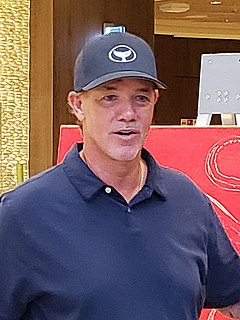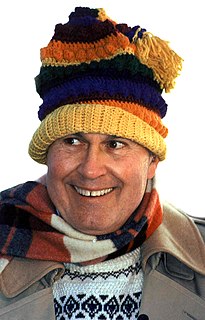A Quote by Tina Brown
TV journalism is a much more collaborative, horizontal business than print reporting. It has to be, because of the logistics. Anchors are wholly dependent on producers to do all the hustling
Related Quotes
The print magazine and print journalism industry is obviously in a great deal of trouble, and one of the things that happened when this business started to give way to the Internet and to broadcast television is that a lot of organizations started cutting specifically investigative journalism and they also started cutting fact-checkers.
Critical journalism has gone out of fashion, or rather, it has been bought out. And so, we have much less of it than we did during the Vietnam era, where there was very critical reporting on the Vietnam War and a lot of disagreement among the media. Now you find that the media are much more homogenous, converging because they all must cater to the same community of advertisers. It's sad to see.
I got in journalism for any number of reasons, not least because it's so much fun. Journalism should be in the business of putting pressure on power, finding out the truth, of shining a light on injustice, of, when appropriate, being amusing and entertaining - it's a complicated and varied beast, journalism.
I think what you have to do in print is to create even more memorable images and more memorable pieces because what one consumes online or in social has a much shorter shelf life, so to speak, so what print has to have is no more weight, but it has to be something that you can't find so easily online. It has to really stand for print.
Every journalism bromide - speaking truth to power, comforting the afflicted, afflicting the powerful - that otherwise would be hopelessly sappy to a journalist of any experience, has become a Twitter grail. The true business of journalism has become obscured because there is really no longer a journalism business.
n terms of the logistics of that from a title perspective, we have not talked about that nor do we typically care very much. We're not large on bureaucracy. My brothers and I said to each other when we started in this business that as a collective we can do far more than any one of us can do individually. And that's really what guides our relationship - this sense of camaraderie. And it is a family business, and we work together collaboratively as a family.
People don't want to pay for pitches. They want to see it. If you hear one more time, "Well, that's execution-dependent." Everything's execution-dependent! If there's something that's going to be a little bit more interesting than The Untitled Slinky Movie, then I think that writers that want to do interesting work and at the same time commercial work need to put it down on paper. So agents and producers that writers are working with are encouraging them to get it on paper because the studios like to see what they're buying rather than just imagine what it could be.
I doubted Black-ish , and I'll tell you why. Because it doesn't matter if a writer wrote it for you. He could've written it with you in mind. But TV is a collaborative art. It involves producers, networks, studios, and many people signing off on you. And a lot of times there are deals in place - actors with studios that they're looking for shows for.
My reporting in Africa wouldn't be political per se, but it's certainly the point of my reporting - and of a lot of other reporters I know: Human suffering is bad, and if reporting stories about it brings it to light and someone does something, that's part of the point of journalism. And it's a thin line between that and activism, and you have to be careful about that.


































